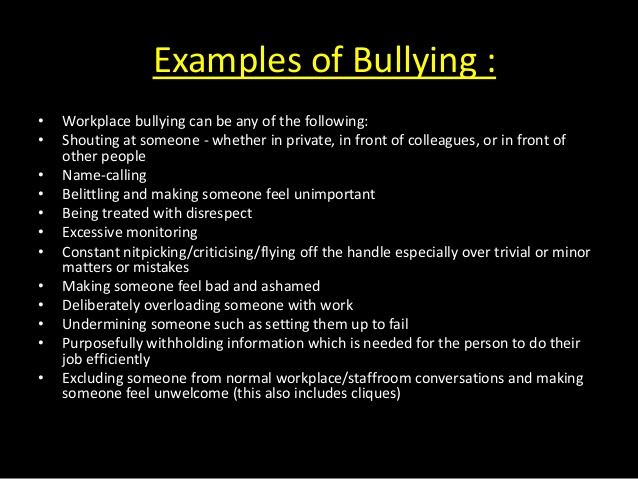Is Your Boss a Bully?
Margaret arrived at work early as always and turned on the lights to get ready for her day in a busy hospital in Baltimore. As soon as she arrived, a lost and scared patient had wandered into her office needing help. Margaret’s peaceful morning was shaken when her boss, a VP and a member of the senior management team, arrived shortly thereafter in a particularly foul mood rudely interrupting her discussion with the patient yelling at her to turn on the copier because she needed copies. Margaret’s boss insulted her in front of the patient then later wrote her up insisting it was more important to turn on a copier for her boss rather than helping a patient. Although Margaret knew that her performance was satisfactory, her boss always made her think she could lose her job. In fact, Margaret’s boss often made derogatory comments that she was stupid or that she was never going anywhere in the organization except out the door. Never was any respect shown to Margaret.
Margaret endured repeated verbal abuse in both the office and at off-site company events. Her boss’s offensive behavior and unreasonable work demands led to Margaret’s ongoing humiliation.
Margaret’s boss is considered the classic bully boss. Bully bosses use intimidation and humiliation to keep their employees on task, not realizing that their behavior often has the opposite effect.
Other Signs of a Bully
Since a bully doesn’t always show you their hand, you need to be wary of these signs:
• Your boss ridicules or humiliates you in front of peers or colleagues (or in office-wide correspondence).
• You find yourself routinely excluded from important meetings or conversations.
• Your boss reassigns your projects without apparent cause and without consulting you.
• You used to socialize with your coworkers, but now they no longer ask you to join them.
• You dread going to work and feel anxious or nauseated at the thought. You’re often tempted to call in sick.
• Your health deteriorates: Your blood pressure goes up, you experience cardiovascular or neurological problems, you gain weight, or you can’t sleep.
While it may be immoral and unprofessional, it is not illegal in the United States for managers to threaten, insult, humiliate, ignore or mock employees. Nor is it illegal to gossip and spread rumors, withhold information, or take credit for someone else’s work.
Unfortunately, these types of bullying are not rare; they take place with distressing frequency.
Health Risks
Anyone spending a significant amount of time in a hostile environment is going to feel somewhat stressed out. But nearly half of bullied workers go on to develop serious anxiety and depression or other physical health conditions.
Emotional angst affects physical health. When you’re continually stressed, your body pumps out fight-or-flight hormones like Cortisol and adrenaline, causing your blood pressure, heart rate, and blood sugar to skyrocket. That ups your risk of heart problems and diabetes. Adults who are harassed at work are also more prone to migraines, stomach upset, body aches, panic attacks, neurological conditions, immune system disorders, and other ailments.
Margaret suffered from chronic migraines for years when she was continually bullied by her boss.
Impact of a Hostile Work Environment
Bullies do a lot of damage in organizations. A bullied employee shows signs of disengagement and lower productivity. They make subordinates run scared and put people in a protective mode, which interferes with the company’s ability to generate innovation. Add to it the rage the bullied employee feels towards the bully and the negativity felt for putting up with such behavior. In fact, these are hardly prime conditions for doing your best work or any work at all.
Fighting Back
Some quit their job after months of torture, but many employees end up staying for months or years in an abusive situation because of a shaky job market or feel the situation may get better. Even if you want to salvage your position, it can be difficult to get help.
Filing a complaint with human resources may seem like a logical first step, but oftentimes it backfires because HR is loyal to top management. Normally, HR does not want to get involved unless there’s a legal reason to do so. As long as your boss isn’t sexually harassing or mistreating you because of your age, race, gender, sexual orientation, or disability, they are generally within their rights to make snide comments or squash your self-esteem.
Tactics You Can Use
Studies have shown that workers who fight back might have the upper hand in the long run. If your boss is hostile, there appear to be benefits to reciprocating. Employees felt better about themselves because they didn’t just sit back and take the abuse.
Confront the bully in private: For example, “I’m sorry you feel you have to do that, but I will not put up with that kind of behavior.” It can be startlingly effective. Bullies lack boundaries on their own behavior.
The Boss Sets the Example for the Team
Good leaders will see the decentralization of the group and will work to correct it. Bully bosses, on the other hand, will exacerbate the problem by supporting their favorite workers and further abusing the employees they dislike. From the CEO down through each layer of management, every leader sets the tone for how the individuals beneath him or her will behave and is ultimately responsible for the atmosphere in which people work. The boss sets the example for the entire team.
In conclusion, if you ever find yourself in this situation, ensure your résumé is ready in case you need to find employment elsewhere. It may not be easy to secure a new position but no job is worth jeopardizing your health.

